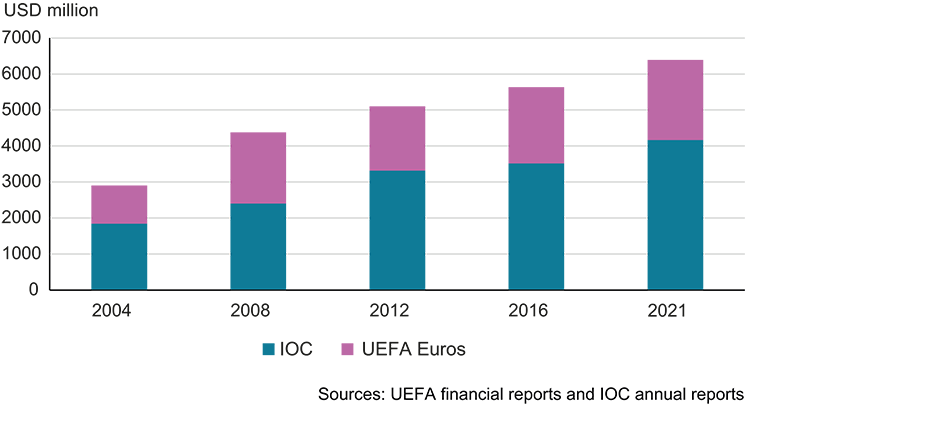
Why the Olympics and the European Football Championships will increase Swiss GDP
KOF is forecasting that the Swiss economy will grow by 1.6 per cent this year. A quarter of this increase will be due to the European Football Championships being held in Germany and the Olympic Games in Paris. KOF economist Alexander Rathke explains the background to this effect.
The European Football Championships begin in Germany in just a few days’ time. And, only two weeks after the final of this tournament takes place in Berlin, the Olympic Games will open in Paris. These two major events are relevant not only for sports fans but also for economists – at least from a Swiss perspective. This is because the European Championships and the Olympics will boost Switzerland’s gross domestic product (GDP) by 0.4 percentage points. Excluding these two competitions, GDP would rise by only 1.2 per cent, according to the KOF Economic Forecast; including these events, the growth rate will be 1.6 per cent.
How does this effect come about? “Switzerland is home to the Union of European Football Associations (UEFA) and the International Olympic Committee (IOC),” explains Alexander Rathke, head of KOF’s Swiss Economy section, “and these organisations generate strong revenues every four years through the sale of broadcasting and licensing rights,” he adds. For a small country like Switzerland, these revenues cause fluctuations in GDP that have nothing to do with the actual economic cycle. This volatility has only a marginal effect on employment. If no major sporting events take place next year, Swiss GDP will be reduced by exactly the 0.4 percentage points mentioned above (to 1.4 per cent instead of 1.8 per cent adjusted for sporting events).
“Non-adjusted GDP gives the wrong signals”
Consequently, KOF also calculates ‘sports-adjusted GDP’ in addition to traditional GDP. The latter is even more relevant for economic monitoring. “Non-adjusted GDP gives the wrong signals,” explains Rathke. For example, the growth rate of non-adjusted GDP will fall next year (from 1.6 per cent to 1.4 per cent) although the economic trend is exactly the opposite owing to the expected global economic recovery (KOF is forecasting that growth will increase from 1.2 per cent to 1.8 per cent after adjusting for sporting events).
Incidentally, a country with a large GDP such as the United Kingdom hardly recognises such effects, even though the country is home to the International Tennis Federation (ITF), for example. The additional value added is simply of little significance there.
Whether countries benefit economically from hosting tournaments is unclear
The economic effect on the organisers of major sporting events should be distinguished from the GDP effect on Switzerland as a result of broadcasting and licensing income, although this is not always positive. “Staging the World Cup in South Africa and Brazil was probably not a good idea in terms of economic policy. It would have been better to invest the money in schools and infrastructure projects instead of stadiums, some of which will not be used in future,” says Alexander Rathke. Hosting a tournament could, in theory, enhance the organiser’s image and boost tourism. However, this benefit is offset by high opportunity costs and risks arising from the subsequent utilisation of infrastructure.
Rathke does not expect the staging of the 2025 European Women’s Football Championships in Switzerland to have a major economic impact either. “The revenue from this event will be fairly low compared with the Olympic Games or the European Championships or World Cup in men’s football.”
Meanwhile, Rathke is not particularly worried about rumours that the International Federation of Association Football (FIFA), which has been based in Zurich since 1932, will move to Saudi Arabia or the United States. “Although it is nice that many major sports organisations have their headquarters in Switzerland, it is not crucial to the country’s prosperity,” says Rathke.
Contacts
KOF Konjunkturforschungsstelle
Leonhardstrasse 21
8092
Zürich
Switzerland
KOF Bereich Zentrale Dienste
Leonhardstrasse 21
8092
Zürich
Switzerland
